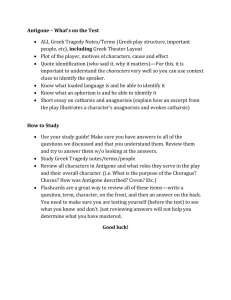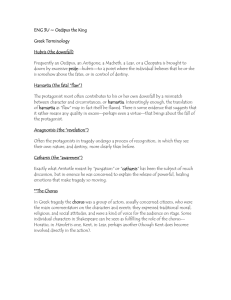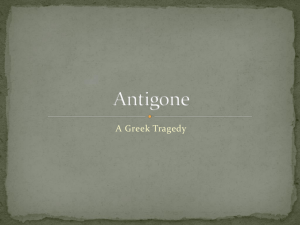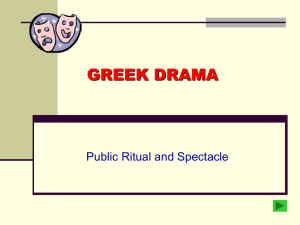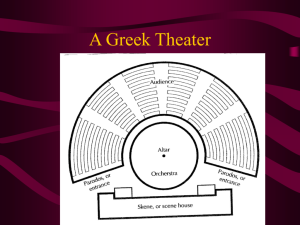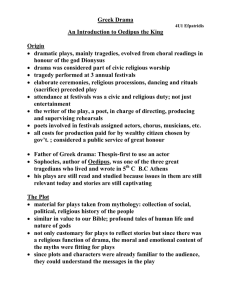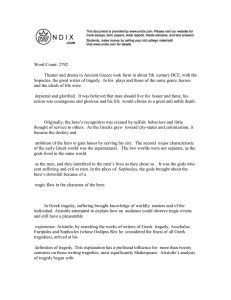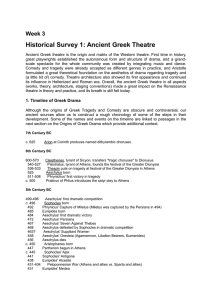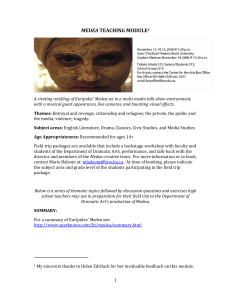Greek Play Origin Notes-
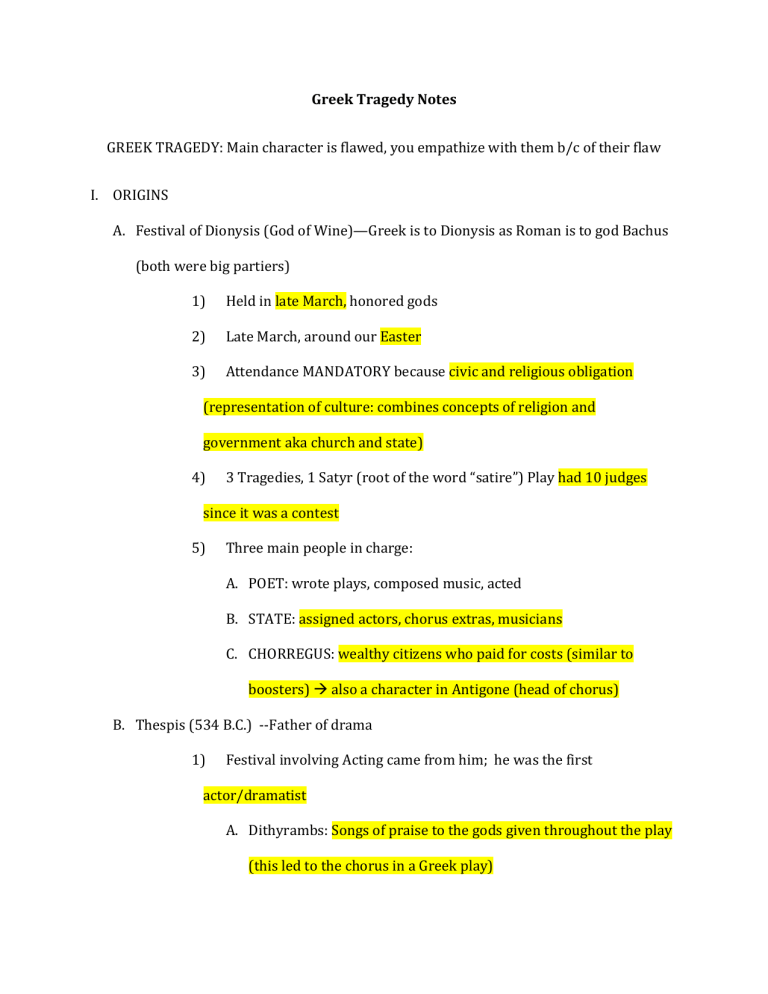
Greek Tragedy Notes
GREEK TRAGEDY: Main character is flawed, you empathize with them b/c of their flaw
I.
ORIGINS
A.
Festival of Dionysis (God of Wine)—Greek is to Dionysis as Roman is to god Bachus
(both were big partiers)
1) Held in late March, honored gods
2) Late March, around our Easter
3) Attendance MANDATORY because civic and religious obligation
(representation of culture: combines concepts of religion and government aka church and state)
4) 3 Tragedies, 1 Satyr (root of the word “satire”) Play had 10 judges since it was a contest
5) Three main people in charge:
A.
POET: wrote plays, composed music, acted
B.
STATE: assigned actors, chorus extras, musicians
C.
CHORREGUS: wealthy citizens who paid for costs (similar to boosters) also a character in Antigone (head of chorus)
B.
Thespis (534 B.C.) --Father of drama
1) Festival involving Acting came from him; he was the first actor/dramatist
A.
Dithyrambs: Songs of praise to the gods given throughout the play
(this led to the chorus in a Greek play)
C.
Aeschylus (ass-kuh-liss): he focused on content more so than Thespis who focused on the acting
D.
Golden age (three great playwrights) Golden Age was the most prolific (present in large numbers or quantities) age of play creation during the Greek period
1) Sophocles 495-406 B.C. –He added a third actor; wrote the most plays of the 3 major playwrights
2) Aeschylus
3) Euripides (your-ip-uh-deez)
II.
STRUCTURE OF PLAY—Literally the structure of Antigone VERY important in understanding the play
A.
Prologue: Opening scene; establishes background by one or two person dialogue; discusses what’s going on (exposition in dialogue form)
B.
Parados: Entrance of chorus where they chant in relation to the theme. There is a chute in the physical theater where the chorus and actors enter also called the parados.
C.
Episode: Plot is developed through action and dialogue (TV episodes)
D.
Stasimon/Ode: Choral ode; comes at the end of EACH episode and highlights the main themes of each episode (similar to what TV shows do to recap the episodes before)
E.
Exodus: Ceremonial exit of the players (mostly dragging bodies, since everyone dies in a tragedy)
III.
STRUCTURE OF THEATER (see graphic and draw in box)
A.
Theater
B.
Orchestra
C.
Altar or thymele (thigh-mee-lay)—means “animal sacrifices” in Greek
D.
Parados: corridors leading from the side
E.
Proscenium (pro-skee-nee-um): raised platform/stage
F.
Skene (ski-knee): façade of a background; creates the backdrop and houses the actors (scenery in modern plays)
1) Masks: Meant to project voice (megaphone-esque piece on front) AND meant to reveal the type of character (good characters would be light
colored, evil would be dark colored)—so audience could see from far away who was who
IV.
ARISTOTLE’S (384-322 B.C.) POETICS
A.
He had a hand in making plot structure (LOVED formulas)
B.
Catharsis: aim of tragedy is to bring about catharsis in the audience—purging of emotions, ESPECIALLY pity and fear (we experience this through empathy or sympathy). To feel catharsis we must:
1) Pity the characters for their flaws and too-late-learned lessons
2) Fear that we may make the same mistakes and suffer the same fate (normally disgrace and death)
*Therefore, experience leaving theater is cleansing, or cathartic.*
C.
Four terms in Aristotle’s Poetics
1.
Hamartia- Tragic flaw
2.
Hubris –excessive pride
3.
Peripetia –ironic twist that leads to a character’s downfall
4.
Anagnorisis (an-ag-nor-iss-iss)- character’s realization of his/her flaw OR understanding of their place in the cosmic order (ancestor’s usually did something, character pays the price)
V.
SIX ELEMENTS OF TRAGEDY
A.
Plot –MOST IMPORTANT = fate/moral order; characterization
B.
Character- look for dynamic changes
C.
Diction- word choice—speech and dialogue
D.
Thought –ideas/philosophies (kind of like theme)
E.
Spectacle –images; scenery; costumes
F.
Song – music and chorus (also points out theme in a very poetic, somewhat confusing manner)
VI.
PLOTS
A.
Mostly taken from mythology
1) Myths were like a bible to the Greeks—knew it before hand.
2) Personal characteristics; come to life—like “Passion of the Christ” (seeing these things made the play more engaging)
3) Recorded social political and religious history
4) Drama had a religious function—poets dealt with subjects of great moral dignitary and emotional significance
B.
Plots and characters already known
1) Advantages- poet could add personal motives and agenda to characterization
2) Disadvantage- suspense not evoked
